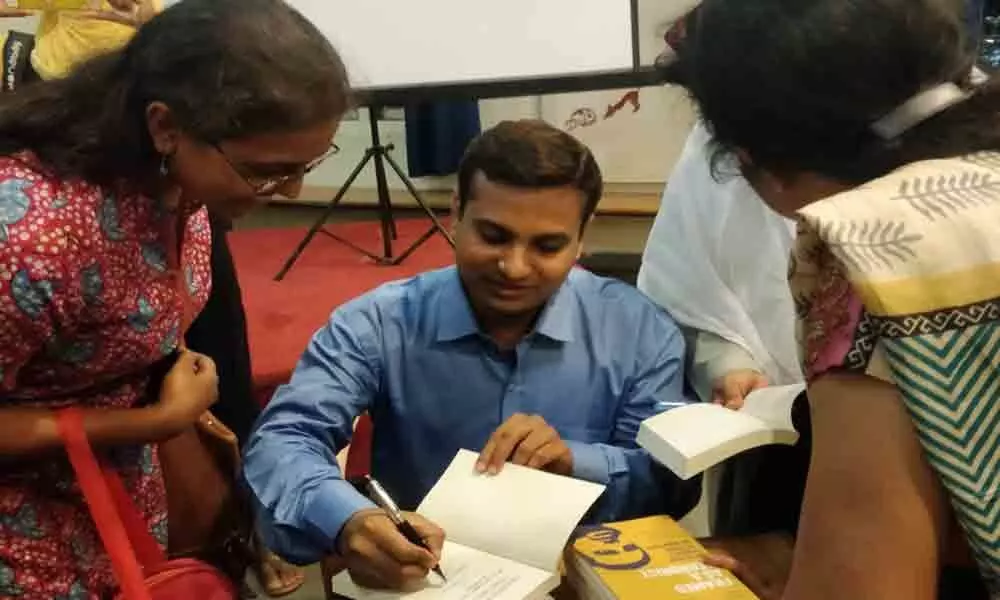Live
- Hyderabad CP CV Anand Issues Stern Warning to Bouncers
- MP Laxman Criticizes Police Conduct, Calls for Support for Victims' Families
- Fire Breaks Out in Kachiguda-Chennai Egmore Express, Passengers Evacuated Safely
- CM Revanth Reddy Condemns Attacks on Film Personalities' Homes, Calls for Strict Action
- Victory Venkatesh and Nandamuri Balakrishna to Set Screens on Fire with Unstoppable Season 4
- Over 71.81 crore Ayushman Bharat Health Account numbers generated: Centre
- In special gesture, Kuwait's Prime Minister sees-off PM Modi at airport after conclusion of historic visit
- Veer crowned PGTI Ranking champion, Shaurya wins emerging player honour
- Sr National Badminton: Unseeded Rounak Chauhan, Adarshini Shri reach singles semis
- Punjab seeks central assistance to strengthen security in areas adjoining Pakistan
Just In

Mohd Amir Khan spent 14 years in jail for a crime didn't commit, he was acquitted as innocent in 2012 and is now a Human Rights Activist and author.
Mohd Amir Khan spent 14 years in jail for a crime didn't commit, he was acquitted as innocent in 2012 and is now a Human Rights Activist and author.
Amir was only 18 years old on the night he was arrested and he specifically mentions, "I would like to call it a kidnapping and not an arrest because I was taken by a few men, who were not in any kind of uniform and then they took me to an unknown location."
Amir recalls that he had no clue that the men who took him were police officers. Amir was still under the assumption that he was being taken away by some criminals since no procedure was followed.
Amir realised he was inside a cell surrounded by 10-12 men, who tortured him for seven continuous days, he was beaten up, given electric shocks and nails were removed from his hands and legs forcibly when he had refused to sign a bunch of blank papers. He finally succumbed to the torture and signed 150 blank papers. "This method of torture has been put on a ban by the doctors currently," he concluded.
After more than a year had passed Amir had finally learnt that he was now the main accused for 1996-97 Delhi Bomb Blasts. The case was under trial and Amir was in jail. "I was sure of my innocence and knew one day I would be acquitted," said Amir and continued about how he used his time wisely in jail by continuing to pursue his studies.
He finished a vocational course and also started undergraduate course from IGNOU. However, in the year 2000 a new jailer had been assigned to his prison. "This new jailer had grown some kind of special love for the inmates who were accused in cases related to terrorism," said Amir sarcastically.
He had worked out a scheme, which got Amir locked up in a cell with no light and any sort of option to communicate with anyone. He was in that dark cell for five months, which took a massive toll on his physical and mental health. He even started to lose his memory. The only ill he mentioned from this dark alienation was that he couldn't complete his graduation.
Amir was later moved to the Ghaziabad jail when things went further south for him. Now no lawyer was ready to fight his case as they already assumed him to be a traitor. After much struggle by his mom they came in contact with Narayan Das Pancholi, a Human Rights Lawyer, who took his case up and in January 2012 he was acquitted of all charges. He was 32 years old when he stepped out of jail!
Commenting on the Indian Judicial System Amir compared our law to a spider's web where tiny insects like him get trapped and the more they try to get out the more they are sucked in and at the same time he says he firmly believes that the only way to get out this web is through the same law. Amir says that this wrongful imprisonment is not just pertained to Muslims only but also to a lot of underprivileged people in this country.
"It would be ideal if everyone is educated more about how the law and order actually works in this country. If only my parents were aware of the rule that within 24 hours of an arrest there should have been a case registered, which in my case had not happened and I might have not spent 14 years in jail."
"Muslims were the only community with a choice at the time of the partition and the Muslims that stayed in India choose to stay here. We chose Gandhi instead of Jinnah isn't that enough proof that we belong to India?" Amir said about Muslims being the scapegoats.
When asked on what changes could be made to our law; Amir pointed out that there is a proper rehabilitation system in place for terrorists, who surrender. Also, there is no policy for the wrongly accused. Amir considers himself very lucky and said there are many others who aren't as lucky and fears that this will only increase with growing of lynching and the introduction of UAPA and NRC bills.
Amir is now married to his childhood sweetheart and also is a proud father. He fears for what kind of India her daughter will grow into and hopes that it is one where India is a secular democratic.
Amir along with Nandita Haska penned a book titled 'Framed as a Terrorist: My 14-Year Struggle to Prove My Innocence' about his ordeal.

© 2024 Hyderabad Media House Limited/The Hans India. All rights reserved. Powered by hocalwire.com







